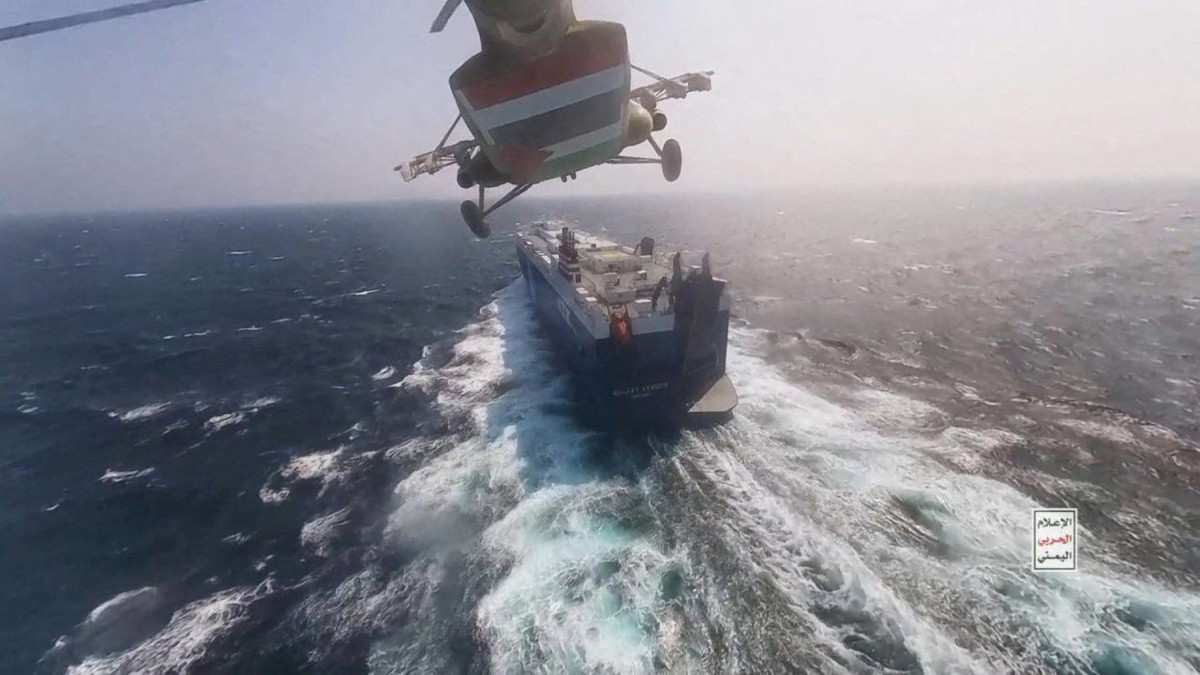Risks Ahead: Implications Following the Creation of the New Naval Force in the Red Sea
- 28 Dec 2023


Despite the escalated attacks by the Houthi militia on Israeli and Israel-bound vessels in the Red Sea, the international response, notably from the U.S., remains restrained and hasn't effectively deterred further aggression. This is evident even after the December 19, 2023, announcement of a new naval coalition called the " Prosperity Guardian," consisting of ten nations. The minimal actions taken by the United States seem to have conveyed a message to the Houthi militia that they interpreted as a green light, encouraging them to persist with their aggressive tactics and potentially escalate threats against Israel and vessels bound for its ports.
The sustained attacks likely influenced U.S. Secretary of Défense Lloyd Austin's decision to embark on a regional tour encompassing Bahrain, Qatar, and Israel starting December 18. The Biden administration is actively evaluating strategies to address these challenges. In response to the threats, several shipping firms are now circumventing the Bab-el-Mandeb Strait, opting instead for the longer and costlier Cape of Good Hope route.
Several Reasons
The U.S. stance regarding the Houthi attacks appears primarily reactive in nature. The United States prioritises defending against the assaults initiated by the Houthi militia, be it through drones or ballistic missiles. For instance, on December 16, 2023, the U.S. Central Command reported that an American guided-missile destroyer intercepted and downed 14 drones launched by the Houthi militia in the Red Sea(1). Such actions highlight the ongoing efforts by American forces to thwart militia-led attacks, whether they target the Red Sea or extend to locations like the Israeli port of Eilat. Additionally, the role and mandate of the newly formed naval coalition, "Prosperity Guardian" remain ambiguous. It's unclear whether their mission will solely focus on thwarting Houthi militia attacks or if they intend to retaliate against such assaults.
Several factors necessitate that the United States of America carefully calibrate its response to the persistent assaults by the Houthi militia in the Red Sea. Among the foremost considerations are:
Consequently, Washington deployed the aircraft carriers "USS Gerald Ford" and "USS Eisenhower" to the eastern Mediterranean region. This move aimed to deter certain countries and parties from supporting the Hamas movement and to increase the operational costs for Israel's military operations within the Gaza Strip.
It is noteworthy that despite approximately 75 days since the outbreak of the war in the Gaza Strip, the Biden administration continues to prioritise this objective. This was evident in the recent tour b of the region by U.S. Secretary of Defence Lloyd Austin commencing on December 16, 2023(2). During this tour, Austin aimed to exert pressure on Israel to establish a schedule for military operations in the Gaza Strip. The premise is that halting operations to a certain extent and at a specific time would suffice to mitigate the risk of expanding the scope of the war, which remains a concern in the American vision.
This specific objective is the primary reason Washington has restrained its responses to the Houthi attacks to merely repelling them and thwarting their objectives. The underlying belief is that elevating the level of retaliation against the Houthi militia might inadvertently lead to the broader conflict expansion that Washington has been keen to prevent from the outset. This stance could clarify the U.S.'s messages indicating its reluctance to "stand alone in countering the Houthis. (3)
The First objective is to hinder Iran from reaching a pivotal point where it can develop a nuclear weapon, a threshold that the American administration is adamant about preventing, even with the U.S. potentially entering a presidential election year. Consequently, Washington believes that maintaining these understandings can effectively constrain Iranian nuclear escalation. This, in turn, paves the way for future negotiations aimed at achieving a renewed nuclear agreement between the two nations.
The second objective is to exert influence on Iran, urging it not to broaden the scale of the ongoing war initiated by Israel within the Gaza Strip. Should this scenario materialise, it could compel the United States of America to transition from merely backing Israel on political, military, and economic fronts to directly participating in the war.
Interestingly, this objective aligns with Iran's own strategic considerations. From the outset, Iran was eager to emphasise its non-involvement in the "Al-Aqsa Flood" operation, sending multiple signals suggesting genuine surprise at the event. In fact, Iran specifically directed Hezbollah to maintain a restrained level of military escalation with Israel in southern Lebanon, potentially to avoid escalating the war to a point where Iran would be compelled to engage directly.
The United States of America holds the belief that any significant escalation against the Houthi militia, such as conducting military strikes in areas under their control or reinstating them on the list of terrorist organisations—a decision President Biden reversed shortly after taking office on January 20, 2021—could potentially disrupt the current negotiations with Iran. Such actions could complicate Washington's regional strategies, especially during a period when the administration is focused on the upcoming presidential elections, which President Biden aims to win for a second term.
Indeed, Iran has issued cautionary statements concerning the United States’ proposed initiative to establish an international force aimed at safeguarding the freedom of navigation in the Bab el-Mandeb Strait. This stance suggests that Iran views any effort to diminish the Houthi militia's capacity to disrupt shipping in the area as conflicting with its current strategic interests and calculations.
In this vein, on December 14, Iranian Defence Minister Mohammad Reza Ashtiani remarked, "The United States of America would encounter significant challenges in the Red Sea by establishing an international force." He elaborated, "The area is already densely congested; there's hardly any room for additional presence. S It would undoubtedly be met with considerable resistance if they pursued such a course .Engaging in such a misguided action would present them with formidable obstacles. (4)
13% of global trade traverses this area. Data suggests that approximately 7.8 million barrels of oil and fuel transited through this zone daily in the first eleven months of 2023(5). Such a significant volume underscores the potential consequences of any disruption to trade flow in this critical region. Such disruptions could elevate costs related to commodity transport and shipping insurance and influence global oil prices.
However, what stands out in this scenario is the specificity of the Houthi militia's attacks, which have predominantly targeted ships destined for Israel, regardless of whether they are Israeli vessels or under the flag of another nation. This targeted approach suggests that the resulting damages, from this perspective, might still be relatively contained. They have not escalated to a point that would compel Washington and several regional and global powers to step in and safeguard the uninterrupted flow of global trade in this vital area. This suggests that the mission of the newly established naval coalition might closely align with the actions already undertaken by American naval ships, primarily focused on defending against Houthi assaults.
Two primary determinants stand out:
Given this context, the magnitude of the international response, particularly from the U.S., to the Houthi militia's actions in the Red Sea hinges on two pivotal factors. First, it will be contingent upon the scale and intensity of these attacks in subsequent phases, particularly as the Houthis have issued threats to target vessels bound for Israel unless the Gaza military operations cease. Additionally, the Houthis' steadfastness in their stance, as evidenced by their reaction to the introduction of the new naval coalition, emphasises their commitment to their ongoing strategies.
Second, the duration of the ongoing Israeli military operations will significantly influence the international response. Currently, Israel shows no signs of imminent cessation of these operations or entering a ceasefire. Despite regional and global pressures on Benjamin Netanyahu's government to impose a timeline on these operations and reports suggesting potential new agreements with Hamas, internal pressures within Israel, coupled with its determination to neutralise Hamas's military capabilities, including targeting its leadership, maintain an atmosphere of uncertainty. Consequently, escalation continues to be a dominant theme in regions where pro-Iranian militias are present.
1- مدمرة أمريكية تسقط 14 طائرة مسيّرة أطلقها الحوثيون في البحر الأحمر، صحيفة الشرق الأوسط، 16/12/2023، متاح على الرابط التالي: https://2u.pw/gyjQ2at
2- أوستن يزور المنطقة.. هل يقنع إسرائيل بوقف الحرب البرية؟، سكاى نيوز عربية، 18/12/2023، متاح على الرابط التالي: https://2u.pw/4iPLf7h
3- واشنطن تريد تحالفاً في مواجهة الحوثي.. وفصل اليمن عن الصراع، موقع العربية نت، 12/12/2023، متاح على الرابط التالي: https://2u.pw/TSETwTO
4- طهران تتوعد واشنطن بـ "مشكلات استثنائية" في البحر الأحمر، صحيفة الجريدة الكويتية، 15/12/2023، متاح على الرابط التالي: https://2u.pw/TNqsxT0
5-أحمد الغدار، حقائق-شريان باب المندب الملاحي الحيوي يصبح هدفاً وسط تداعيات حرب إسرائيل وحماس، سويس انفو، 18/12/2023، متاح على الرابط التالي: https://2u.pw/lv2RfKl
The stated views express the views of the author and do not necessarily reflect the views of the Center or the work team.
Comments